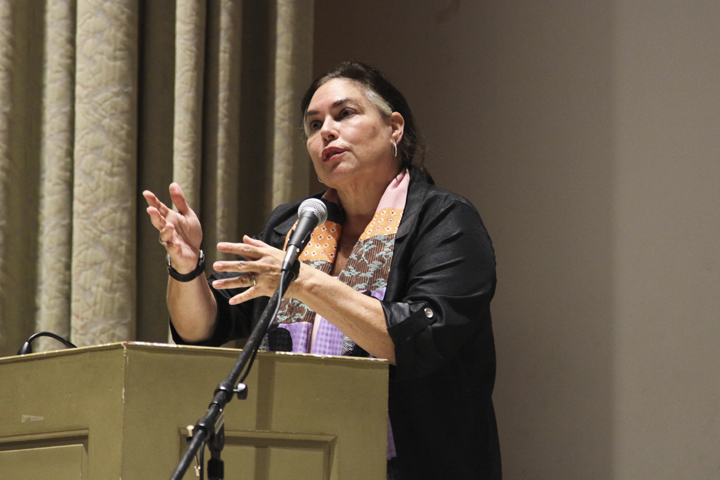Novelist Amy Bloom said she knows why people write.
“At the heart of reading and writing are the questions, ‘Who are we to be? How are we to be?’” Bloom said. “That’s what we want to answer.”
Bloom, a National Book Award finalist who has authored three books, three short story collections and numerous essays, spoke at the Frick Fine Arts auditorium Monday night as part of the Pittsburgh Contemporary Writers Series.
In her speech, “The Writers’ Life: Where the God of Love Hangs Out,” Bloom spoke about the importance of a writer’s personal voice and of connecting with the reader.
Pitt students and faculty, as well as the general public, came to the talk to hear Bloom’s perspective on what makes an honest writer and what there is to learn from other writers, but also to see what an accomplished author is like in person, beyond words on a page.
“The goal of writing is to take your particular language –– not anybody else’s –– and make into sentences your own feelings and observations that will pass on from you to another,” Bloom said.
Bloom went on to encourage writers to make their work more meaningful by opening their eyes and ears to the lives of others’. She also suggested avoiding stereotyping or jumping to conclusions.
“If you want to understand other people, the first rule is to listen and to not assume that someone thinks a certain way based on what they look like,” Bloom said. “Give them a chance to reveal themselves.”
The talk was part of the Pittsburgh Contemporary Writers Series, which is free and open to the public. Lynn Emanuel, a professor of English at Pitt as well as the founder and director of PCWS, said at Bloom’s talk that the purpose of the series is to bring in contemporary writers who demonstrate the connection between art and thinking.
“PCWS is here to assert that the writing of fiction, nonfiction and poetry is intellectual work,” Emanuel said.
According to the organization’s website, most events take place on Pitt’s campus and about 200-250 people attend each talk. Past guests of the program include famed nonfiction writer and reporter Gay Talese and award-winning poet and essayist Anne Carson.
“For students, it makes writing come to life. It connects what they read to a living person,” said Sten Carlson, managing director of PCWS. “A lot of faculty teach the books written by the people we bring in to speak, so it’s important for them to come meet [the authors] in person.”
Peter Trachtenberg, an associate professor in Pitt’s writing program and longtime attendee of PCWS events, said he attended Bloom’s talk for a chance to see one of his favorite authors speak and to hear another writer’s perspective on writing and the world.
“These talks are a good way to learn about other people’s writing processes,” Trachtenberg said. “And it’s exciting to see the mind on the page connected to a body.”
Trachtenberg said he found it interesting to hear Bloom’s views on writing in person since he feels he can relate to her voice through her work.
“I can actually connect with Bloom’s perspective on the page since she and I are both influenced by a similar background as natives of New York City,” Trachtenberg said.
Rachel Ann Brickner, a graduate student in Pitt’s fiction writing program, said she came to “relearn” important aspects of writing by learning more about Bloom’s creative process.
“Part of these events is about community [and] about engaging with others interested in writing,” Brickner said. “Another part, for me, is about being reminded of things that are easy to forget, such as the importance of observation, empathy and language. These are easy to lose sight of, I think, especially at grad level.”
Bloom emphasized the importance of language as a way to connect and empathize with others.
“The reasons to talk about reading and writing is not because everybody needs to be writers but because everybody needs to have the capacity to see other people for what they are and understand them,” Bloom said.


